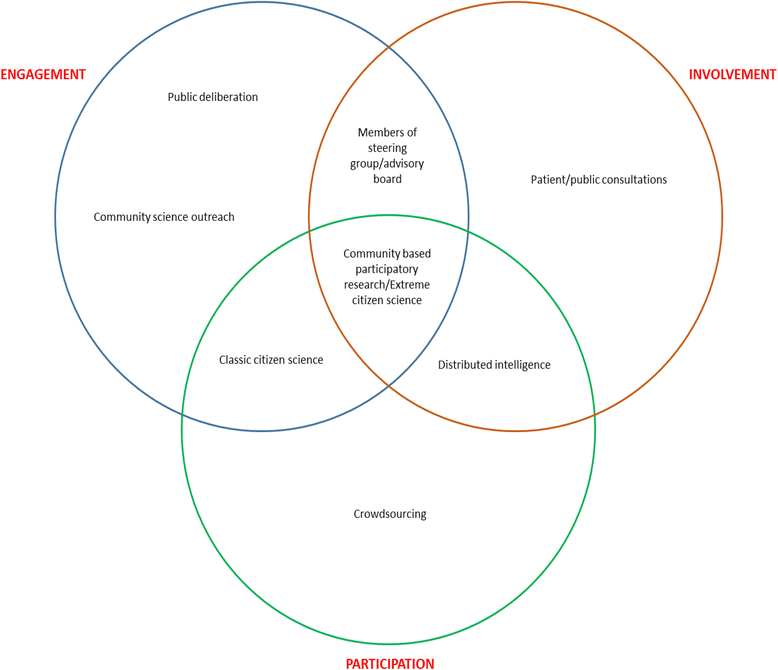Citizen science or scientific citizenship? Disentangling the uses of public engagement rhetoric in national research initiatives
- PMID: 27260081
- PMCID: PMC4893207
- DOI: 10.1186/s12910-016-0117-1
Citizen science or scientific citizenship? Disentangling the uses of public engagement rhetoric in national research initiatives
Abstract
Background: The language of "participant-driven research," "crowdsourcing" and "citizen science" is increasingly being used to encourage the public to become involved in research ventures as both subjects and scientists. Originally, these labels were invoked by volunteer research efforts propelled by amateurs outside of traditional research institutions and aimed at appealing to those looking for more "democratic," "patient-centric," or "lay" alternatives to the professional science establishment. As mainstream translational biomedical research requires increasingly larger participant pools, however, corporate, academic and governmental research programs are embracing this populist rhetoric to encourage wider public participation.
Discussion: We examine the ethical and social implications of this recruitment strategy. We begin by surveying examples of "citizen science" outside of biomedicine, as paradigmatic of the aspirations this democratizing rhetoric was originally meant to embody. Next, we discuss the ways these aspirations become articulated in the biomedical context, with a view to drawing out the multiple and potentially conflicting meanings of "public engagement" when citizens are also the subjects of the science. We then illustrate two uses of public engagement rhetoric to gain public support for national biomedical research efforts: its post-hoc use in the "care.data" project of the National Health Service in England, and its proactive uses in the "Precision Medicine Initiative" of the United States White House. These examples will serve as the basis for a normative analysis, discussing the potential ethical and social ramifications of this rhetoric. We pay particular attention to the implications of government strategies that cultivate the idea that members of the public have a civic duty to participate in government-sponsored research initiatives. We argue that such initiatives should draw from policy frameworks that support normative analysis of the role of citizenry. And, we conclude it is imperative to make visible and clear the full spectrum of meanings of "citizen science," the contexts in which it is used, and its demands with respect to participation, engagement, and governance.
Keywords: Big data; Care.data; Citizen science; Citizenship; Crowdsourcing; National health research; Participant centric initiatives; Precision medicine; Public engagement; Recruitment.
Figures
Similar articles
-
Participatory Genomic Research: Ethical Issues from the Bottom Up to the Top Down.Annu Rev Genomics Hum Genet. 2017 Aug 31;18:357-367. doi: 10.1146/annurev-genom-091416-035230. Epub 2017 Apr 19. Annu Rev Genomics Hum Genet. 2017. PMID: 28426284 Review.
-
Imagining the model citizen: A comparison between public understanding of science, public engagement in science, and citizen science.Public Underst Sci. 2024 Aug;33(6):709-724. doi: 10.1177/09636625241227081. Epub 2024 Feb 18. Public Underst Sci. 2024. PMID: 38369701
-
Credit for and Control of Research Outputs in Genomic Citizen Science.Annu Rev Genomics Hum Genet. 2020 Aug 31;21:465-489. doi: 10.1146/annurev-genom-083117-021812. Annu Rev Genomics Hum Genet. 2020. PMID: 32873078 Review.
-
Globalizing and crowdsourcing biomedical research.Br Med Bull. 2016 Dec;120(1):27-33. doi: 10.1093/bmb/ldw044. Epub 2016 Nov 23. Br Med Bull. 2016. PMID: 27941038 Review.
-
The Rise of Citizen Science in Health and Biomedical Research.Am J Bioeth. 2019 Aug;19(8):3-14. doi: 10.1080/15265161.2019.1619859. Am J Bioeth. 2019. PMID: 31339831
Cited by
-
Technical assistance in the field of risk communication.EFSA J. 2021 Apr 29;19(4):e06574. doi: 10.2903/j.efsa.2021.6574. eCollection 2021 Apr. EFSA J. 2021. PMID: 33968254 Free PMC article.
-
Ethics framework for citizen science and public and patient participation in research.BMC Med Ethics. 2022 Mar 13;23(1):23. doi: 10.1186/s12910-022-00761-4. BMC Med Ethics. 2022. PMID: 35282819 Free PMC article.
-
No person left behind: Mapping the health policy landscape for genomics research in the Caribbean.Lancet Reg Health Am. 2022 Sep 18;15:100367. doi: 10.1016/j.lana.2022.100367. eCollection 2022 Nov. Lancet Reg Health Am. 2022. PMID: 36778076 Free PMC article. Review.
-
Scaling up public mental health care in Sub-Saharan Africa: insights from infectious disease.Glob Ment Health (Camb). 2021 Nov 11;8:e41. doi: 10.1017/gmh.2021.41. eCollection 2021. Glob Ment Health (Camb). 2021. PMID: 34868611 Free PMC article.
-
Participant-Centric Initiatives and Medical Research: Scoping Review Protocol.JMIR Res Protoc. 2017 Dec 12;6(12):e245. doi: 10.2196/resprot.7407. JMIR Res Protoc. 2017. PMID: 29233800 Free PMC article.
References
-
- INVOLVE: What is public involvement in research?. http://www.invo.org.uk/find-out-more/what-is-public-involvement-in-resea.... Accessed 14 Dec 2015.
-
- NIHR: INVOLVE, Briefing notes for researchers: public involvement in NHS, public health and social care research. Hayes H, Buckland S, Tarpey M. February 2012. http://www.invo.org.uk/posttypepublication/involve-briefing-notes-for-re.... Accessed 14 Dec 2015.
MeSH terms
Grants and funding
LinkOut - more resources
Full Text Sources
Other Literature Sources
Molecular Biology Databases
Research Materials


